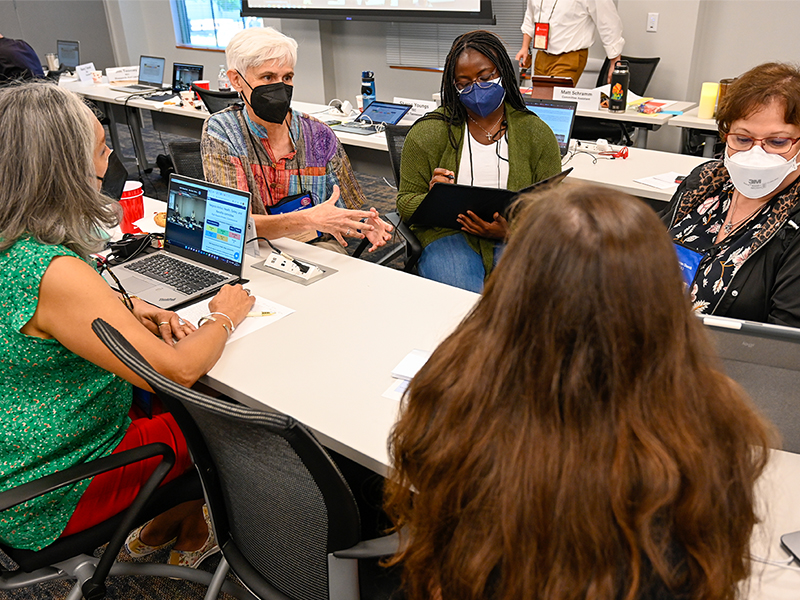
Participants in the Health, Safety, and Benefits Committee participated in a group discussion on June 23, 2022 at the Presbyterian Center in Louisville, Kentucky. (Photo by Rich Copley).

Participants in the Health, Safety, and Benefits Committee participated in a group discussion on June 23, 2022 at the Presbyterian Center in Louisville, Kentucky. (Photo by Rich Copley).
On the very day the Supreme Court took away a woman’s right to choose in several states, the Health, Safety and Benefits Committee twice voted on items that reaffirm the Presbyterian Church (U.S.A.)’s stand on choice and reproductive justice.
Hours after news of the high court’s decision made its way into committee members’ smartphones, the committee, by wide margins, approved HSB-03, “A Resolution on Reproductive Justice” from the Advocacy Committee for Women’s Concerns, and HSB-11, “On Affirming Reproductive Justice,” a commissioner’s resolution.
The latter included an amendment urging to Board of Pensions “to continue to develop the policies and practices that will ensure that Plan members be able to access reproductive health care and abortion equitably, no matter the state they live in.”
The Rev. Dr. Frank Spencer, president of the Board of Pensions, said the Board welcomes the amendment.
“We recognized that [today’s Supreme Court] decision was likely to come,” he said. The Board of Pensions already has “certain travel expense reimbursements in place,” Spencer said.
“We are all carrying some heavy weight today,” said Madison McKinney, the ACWC’s co-chair. “We are here for a reason. It’s not by accidental timing the Supreme Court decision happened today.”
Speaking on behalf of HSB-03, McKinney said reproductive justice, a term coined by a dozen Black women nearly 30 years ago, focuses on reproductive rights and social justice.
“We wrote this [resolution] two years ago,” McKinney said. “Now it’s a crisis situation for so many people.”
“What is the Presbyterian Church willing to do?” McKinney asked the committee. “Let us sit in this pain and rise together in anger to fuel the change that is needed.”
Earlier, committee member the Rev. Michelle Bartel of the Presbytery of Wabash Valley was called on to pray. “Lord, so many of us anticipate incredible suffering. We anticipate that people are going to become even poorer. We anticipate that this will certainly hurt Black people, Indigenous people, people of color more than it will those of us who are white.”
“So, what we want to offer you first, O Lord, is our laments — our sorrow, the loss and the grief that comes with such a change in our country’s way of doing things … But Lord, what we really want to do right now is walk forward into hope. That’s the only place it’s going to be.
“Help us to learn the actual things we can actually do for actual people to manifest your love and to exhibit your realm of love and goodness and peace and joy and justice in the world as we are called to do.”
Family leave policy
Committee members also overwhelmingly approved HSB-06, “On Amending G-2.0284 and Recommendations Regarding a Family Leave Policy,” from the Family Leave Policy Task Force. It also determined that HSB-07, from Hudson River Presbytery, was answered by its action on HSB-06.
HSB-06 says that terms of call for ministers of Word and Sacrament shall include a minimum of eight weeks paid family medical leave and defines family leave as including leave to accommodate the birth, foster placement or adoption of a child; leave to provide care to an ill or disabled family member; and leave to heal following a loss or tragic event.
Church pastors “are our leaders,” said Contina Lundy, co-moderator of the Family Leave Policy Task Force, who spoke to the committee by telephone. “If we can be considerate of what they give us, then we need them to be healthy in mind, body and spirit” in order to lead congregations.
“That’s what the policy is all about,” said JoAnne Sharp, co-moderator of ACWC and an advisor to the task force, “the balance between family and service to the church.”
More on mental health
On Thursday, the committee passed three measures strengthening mental health ministry across the denomination. On Friday, committee members unanimously passed a fourth, HSB-10, a commissioner’s resolution called “On Addressing Mental Health Challenges at Every Level of the Church.”
The resolution commends the Board of Pensions for its work “in widely interpreting a focus on wholeness and mental health across the church.” It encourages the Board of Pensions to “focus further attention on the promotion of mental health initiatives … specifically with respect to [Plan members’] culture, race and ethnicity as they continue to exercise Christ’s compassionate response to Plan members who are hurting.”
It also urges the Board of Pensions to commission a study “to examine and propose policy and process changes, if needed, to ensure compassion … and response to requests from Plan members for mental health assistance and/or psychiatric disability.”
The Board of Pensions’ “commitment to mental health parity is huge,” Spencer told the committee.
Next up
The committee has two items of business scheduled for its final day on Saturday. HSB-05 includes the recommendations from the Survivors of Sexual Misconduct Task Force. HSB-09, from the Special Committee to Study the Reformed Perspective on Christian Education, is on requiring boundary training for certified Christian educators.
